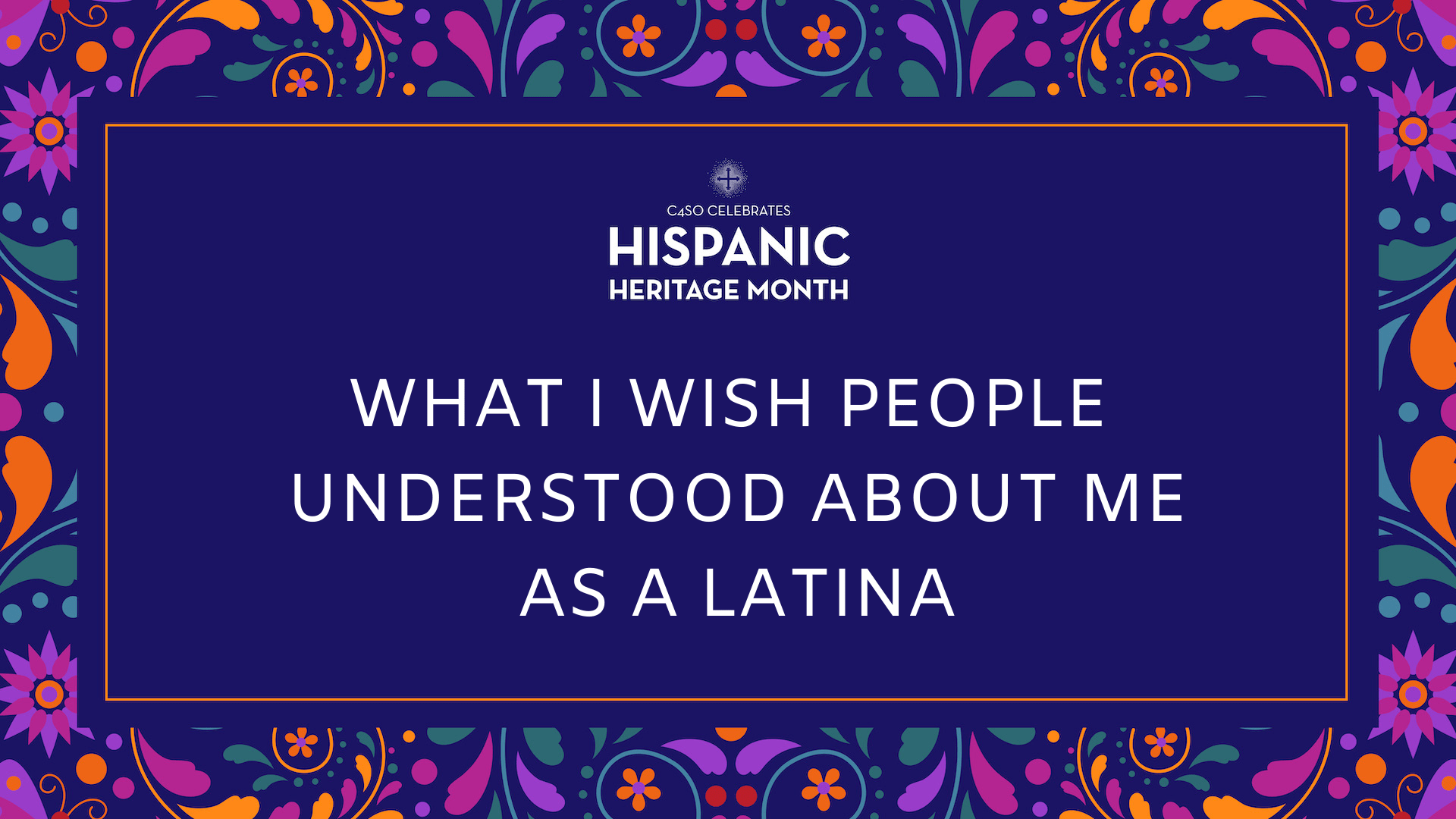by Vania Gomez
Tacos, tequila, fútbol, and amigos. These seem to be the first things people think about when they find out I’m a Latina.
My name is Vania Gomez, and as soon as I introduce myself, I can’t escape people knowing my cultural background. I am a Latina, but I am also a US citizen. For me, it’s often more like “tacos, tequila, a burger and fries.” I find myself with one foot in Mexican culture and traditions and the other in American culture and traditions. Living in the midst of these two cultures often leaves me feeling neither here nor there—not feeling like a whole and true Mexican, or a whole and true American.
I used to feel proud when people were surprised to find out I am Latina/Hispanic, or that they were thrown off when they first heard me speak Spanish. I would go as far as to call myself a coconut (brown on the outside, white on the inside). I felt, and at times still do, that I had to choose one or the other, and the winning side seemed to always be the one that required me to explain myself the least. I would disguise parts of who I was because of the labels automatically put on me by people on either side of my two cultural identities. I felt like I could be accepted as long as I didn’t have to explain the “other” part of who I am, but this left me feeling as if I was lying or hiding who I am as a whole.
When asked, “What do you wish people understood about you as a Latina?” I think first and foremost, I would want people to understand that neither Latina nor American is my whole identity. I am much more than the characteristics traditionally placed on a person of color. Being Latina can have so many different dimensions depending on what country the person is from—for example, we don’t eat the same things and we don’t have the same traditions or dances. But we do hold similar values that transcend countries.
Sometime recently, I was having a conversation with a friend who asked why I did something a certain way. My initial thought was, “What way? Isn’t this what everyone does?” I quickly realized that this was normal on the Latina side of my life, but not on the American side. I felt a welcomed opportunity to share part of my culture and tradition and got a glimpse of two of my paths intersecting, creating a two-way street between cultures. Even though at times it may seem like I am very similar to you, and at other times it may seem that I am very different, both are true.
As a CliftonStrengths coach, I appreciate seeing that our unique talents are individually formed by life experiences. Even two people with the same talent theme may have different ways of using that talent based on cultural, educational, and personal experiences. I find myself often telling my clients, “God has equipped you with the talents and capabilities which have been built throughout your life, family, cultural and educational experiences, and those match the call that he has placed on your life.” This is important because when I say this to them, I am reminded of it myself. It is something that has impacted me greatly as I began to understand my identity as a woman of color. My multi-cultural background and experiences allow me to see something from a perspective that others may have never considered to be true.
When another person’s way of doing things seems strange and uncomfortable, perhaps we need to lean into asking questions and understanding the “why” in order to broaden our reach to someone that, by ourselves, we would never be able to engage. Because our God is multifaceted and represented in each of us, we should seek to better understand and amplify the voices of those whose journey is not the same as ours. When we thwart the voice of others, because it makes us uncomfortable or whatever other reason, we thwart the possibility of the excellence they bring to the table.
As a Latina, I have a great appreciation for family and celebration, for good food. But beyond that, I appreciate sharing food with people. It is not uncommon in Latino/Hispanic households to set a start time for a gathering, but to understand that the end time is something that only God knows. Yes, our feelings, emotions, and thoughts may be closer to the surface than in other cultures, but that’s because we value the sanctity of honesty amongst friends and family. We may be speaking Spanish, English, or even Spanglish, but we’re together.
What I wish that people understood about me as a Latina is that as I stand in the middle of two cultures, I may be able to create pathways on what was once a one-way street, broadening it into a two-way conversation in which we can better represent the Kingdom of God. I wish people would see me as more than just your “typical Latina” or whatever their mind automatically assumes is a Latina. Yes, I am passionate, I am loud, and I do enjoy tacos and tequila, but I am also me. I am woman, I am wife, I am mom, sister, daughter, friend. Beyond all that, I am a co-laborer in the Kingdom, and my goal is the same as yours—to see people transformed by and for the glory of God.

Vania Gomez has been working in intercultural ministry for many years, and is currently a postulant for ordination within C4SO. She also works as the special projects coordinator at the Fuller Center for Spiritual Formation.

